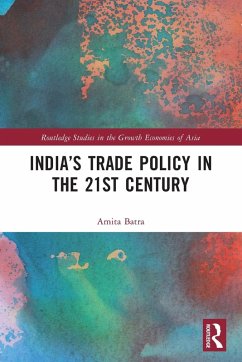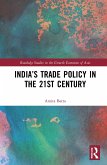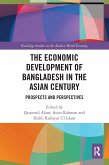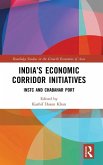This book analyses India's trade policy evolution in the last two decades in the broad context of trends and patterns in global trade and in particular, with reference to the emergence of global value chains (GVCs).
Through an in-depth analysis of its trade policy evolution in the 2000s, the author explains India's limited share of global merchandise trade, especially manufacturing trade and relatively low GVC integration. The book discusses India's trade policy, pattern and global trade participation not just in the comparative context of China as is true of most analyses relating to the Indian economy, economic reforms and trade liberalization in India but also in the context of regional economies like Vietnam, Thailand, Malaysia, Bangladesh and other emerging market economies (EMEs) that have successfully integrated with GVCs/ RVCs in the period under reference. Progress and nature of India's value chain participation relative to other economies has been evaluated in this context. The book further examines policy developments with respect to traditional trade measures like tariffs and export schemes, trade and GVC related policies in special economic zones (SEZs) as well as GVC-facilitating policy instruments such as regional/ free trading agreements (RTAs/FTAs) and investment treaties. Three sectoral case studies - automobiles, textiles and apparel and electronics - are presented to examine India's participation in these dynamic GVC intensive sectors.
An important study of one of the fastest growing economies in the world for almost two decades, this book will be of substantial interest to academics and policymakers in the fields of Economics, International Economics, Foreign Policy, Economic Relations, Economic Diplomacy, Indian- Southeast/East Asian Economics.
Through an in-depth analysis of its trade policy evolution in the 2000s, the author explains India's limited share of global merchandise trade, especially manufacturing trade and relatively low GVC integration. The book discusses India's trade policy, pattern and global trade participation not just in the comparative context of China as is true of most analyses relating to the Indian economy, economic reforms and trade liberalization in India but also in the context of regional economies like Vietnam, Thailand, Malaysia, Bangladesh and other emerging market economies (EMEs) that have successfully integrated with GVCs/ RVCs in the period under reference. Progress and nature of India's value chain participation relative to other economies has been evaluated in this context. The book further examines policy developments with respect to traditional trade measures like tariffs and export schemes, trade and GVC related policies in special economic zones (SEZs) as well as GVC-facilitating policy instruments such as regional/ free trading agreements (RTAs/FTAs) and investment treaties. Three sectoral case studies - automobiles, textiles and apparel and electronics - are presented to examine India's participation in these dynamic GVC intensive sectors.
An important study of one of the fastest growing economies in the world for almost two decades, this book will be of substantial interest to academics and policymakers in the fields of Economics, International Economics, Foreign Policy, Economic Relations, Economic Diplomacy, Indian- Southeast/East Asian Economics.
"Noted trade policy expert and professor of economics at Jawaharlal Nehru University, Amita Batra, presents a riveting account of how India missed the bus on trade in the last two decades [...] Her central point is that the most significant development in global trade in the 21st century has been the rise and rise of global value chains (GVC) as a key trigger for propelling trade among countries. [...] Apart from lucidly articulating her assessment of what went wrong with India's trade policy, Dr Batra provides a mine of data on global trade, with particular emphasis on India. [...] no serious trade economist or trade policymaker in the government should give this book a miss." - AK Bhattacharya, Business Standard, July 2022.
"It would do well to give careful consierations to Amitra Batra's just published book India's Trade Policy in the 21st Century (Routledge, London 2022), which has important messages for policy. The book highlights the role played by global value chains (GVCs)." - Montek Singh Ahluwalia, liveMint, July 2022.
"Batra's extensive research on GVCs provides rare insights into a highly complex web of backward and forward integration in manufacturing that created regional 'factories' of production in specific sectors in the U.S., Japan and Germany." - Dammu Ravi, Ministry of External Affairs, Gateway House: Indian Council on Global Relations, Sept 2022.
"It would do well to give careful consierations to Amitra Batra's just published book India's Trade Policy in the 21st Century (Routledge, London 2022), which has important messages for policy. The book highlights the role played by global value chains (GVCs)." - Montek Singh Ahluwalia, liveMint, July 2022.
"Batra's extensive research on GVCs provides rare insights into a highly complex web of backward and forward integration in manufacturing that created regional 'factories' of production in specific sectors in the U.S., Japan and Germany." - Dammu Ravi, Ministry of External Affairs, Gateway House: Indian Council on Global Relations, Sept 2022.








